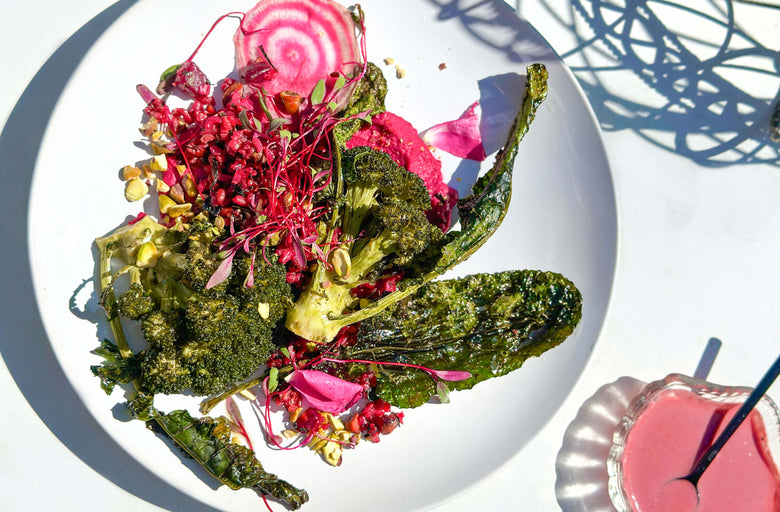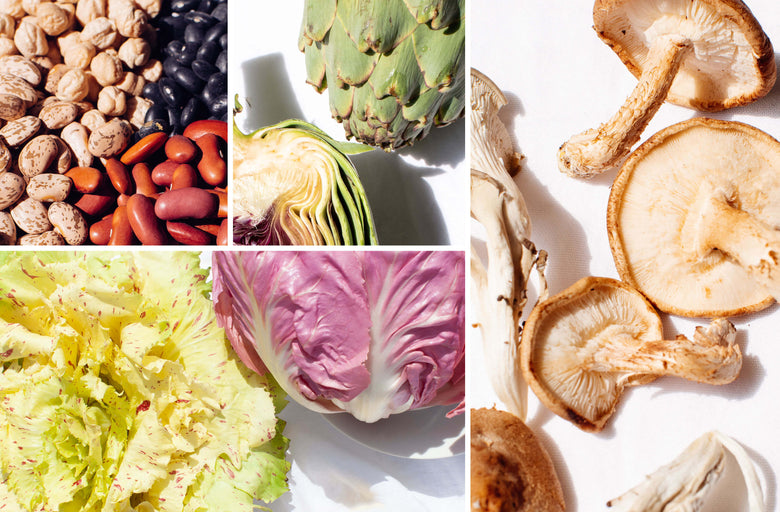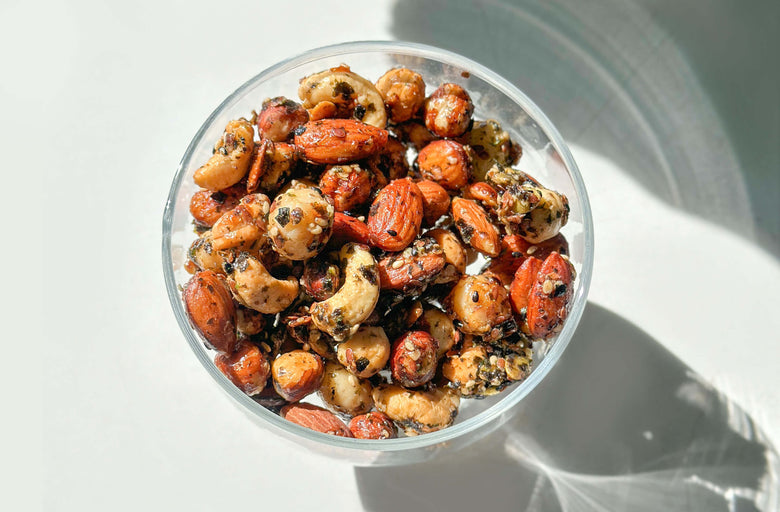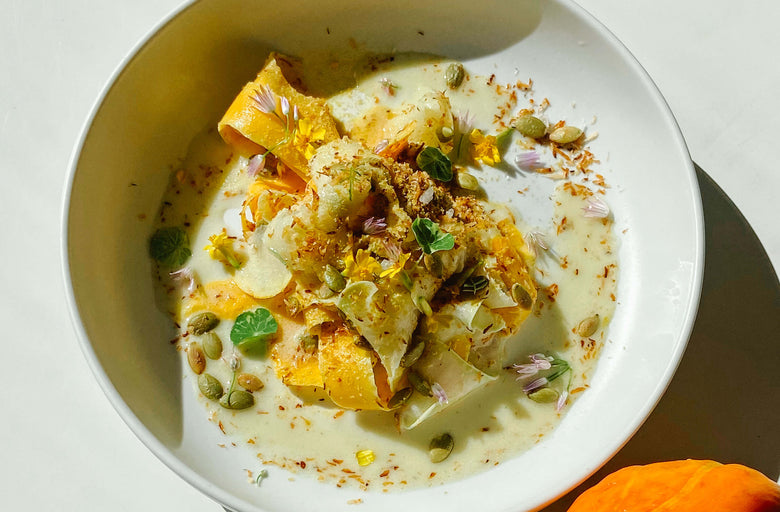Sakara exists at the intersection of science and spirit. Filling our bodies and plates with plants is deeply nourishing to the body and soul—something we know from personal experience that's been confirmed time and again by the latest research.
We sat down with our founders Danielle DuBoise and Whitney Tingle to discuss the radical changes in their health, performance, confidence, and creativity they’ve experienced over years of eating plant-rich nutrition.
Can you talk a little about what plant-forward eating means to you?
Whitney Tingle: I know that the secret to health, longevity, and total-body well-being lies in eating mostly plants. I've witnessed it first-hand both in my own body and in the thousands of testimonials from our clients—plants are medicine. Science agrees, there are certain nutrients (called phytochemicals) that help protect and heal the body that are only found in plants. Additionally, plants feed the beneficial bacteria in your gut (known as the microbiome), which modern science is showing to be the control center of our health. It’s not just contributing to digestion, it’s producing serotonin, controlling hormones, it tells your body how many calories to absorb from your food, and supports your immune system, amongst other things. I don't believe you have to only eat plants to be healthy, but I don't believe you can be healthy and not eat them.
Danielle DuBoise: Plants taught me abundance. I spent a lifetime thinking that I had to diet, eat less, restrict, and remove things from my diet but really what I had to do was eat healing foods and a lot of them. The most powerful healing foods on the planet are plants. I went from worrying about eating too much to realizing I needed to be thinking about eating enough of the good stuff every single day. Not only did this help to heal my relationship with food, but also helped me recover from a lifetime of digestive disorders and physically gave me the body and figure I felt amazing in.
What’s the biggest transformation you've noticed within yourself from eating mostly plants?
Tingle: When I started eating the Sakara way, my desire was to clear my skin and heal from the decade-long battle with cystic acne. Once I started eating more plants, I discovered that my other health concerns like anxiety, weight gain, and female imbalances also went away. Not only is my skin perfectly clear and glowing, but I'm able to maintain my desired weight, and I've never been happier.
How did becoming a mother change your relationship with your body and your view on health?
DuBoise: Becoming a mother rocked my world. I've never been so in awe of my body and what it's capable of. My body created a human, birthed a human, and fed a human. It's wild.
I’ve learned that self-care is not a luxury; it's essential to being a present and loving mother. While pregnant, it's a bit more obvious that we must take care of ourselves, but post-birth, it feels even more critical and easy to forget. You're overworked, exhausted, and so busy loving every moment of it that it's easy to hit the end of the day and realize you haven't taken a full breath… or a shower. As a new mother [and now still], self-care has meant eating Sakara every day and not skipping a meal because I'm too busy, it’s meant asking my husband for more help so I could do my 20 minute workout, and spending my few quiet moments sending gratitude to my body for all it has done and continues to do, to nourish and take care of this new little life.
If you want to prioritize time for yourself and for your family, you have to start drawing boundaries. It’s not a reflex for most women to do it. So you have to learn the hard way.
Why does feeling good in your body matter?
DuBoise: It's freeing. It's stepping into our power instead of diminishing our brightness with guilt, worry, and anxiety about what we should've eaten or wished we looked like. Feeling inferior and bad in our bodies is a terrible distraction from what we should be doing—moving mountains.
Tingle: When you feel good in your body—I mean really good—it impacts the other pieces of your life. If you have confidence and brain clarity, you are going to do better at work. If your hormones are balanced and your libido is stoked, you are going to have better romantic relationships, and overall happiness and gratitude.
What’s a myth about eating plant-based that you'd like to bust?
DuBoise: There are so many, but I'll focus on protein because it's just such a common question. Protein is indeed very important and plays a critical role in several metabolic functions and repairs in the body, but chances are the average American actually gets more than enough protein (97% of Americans eat more than the daily recommended amount of 42 grams). Think about how muscular and fit horses and elephants are, and all they eat are plants. At Sakara, you get anywhere from 40-60 grams of protein every day which is more than enough. 100 calories of spinach is 12 grams of protein, which is more than ground beef. Contrary to popular belief, you do not need to get all of the essential amino acids in one meal or even in one sitting. Our bodies are incredibly smart and capable of pulling necessary aminos from our diets to form complete proteins over days and even weeks. A plant-based diet means that you base your diet on plants, not that you only eat plants. So if you do eat meat, feel free to add them to your Sakara meals. I do on occasion, too!
What we should be obsessing over is fiber. Less than 3% of Americans get enough of this vital nutrient. Fiber plays a huge role in gut and colon health which in turn controls much of our immune system, dictates how many nutrients and calories we absorb from our food, and plays a huge role in brain function and health.
Tingle: A huge myth is that all plant-rich diets are the same. There are unhealthy plant-based diets that are filled with corn, soy, and simple carbohydrates. There are plant-based diets that are boring and flavorless. But then there are ones, like we do at Sakara, that are the healthiest foods on the planet that nourish your body on a biological level, and are made with love by top chefs. With herbs and spices that awaken the taste buds, and deep cacao and coconut that feel indulgent and warm the soul. Also, the myth that if you eat plant-based you have to be a vegan. I believe in eating mostly plants. I focus on getting enough plants into my diet, and then if I want to eat other things, I listen to my body and eat that, too.
What are other grounding rituals and wellness practices that complement your nutrition philosophy?
Tingle: I love to do yoga. It connects my mind and body. It's a way to quiet the "monkey mind" that might be telling me things like, "I'm not good enough" so that I can listen to my inner voice and truth. Yoga always brings me back to center.
DuBoise: I remind myself that there are no rules. If I want that extra glass of wine or bite of cake, I do it, guilt-free and sans anxiety. I believe in joy and I've learned there is no wagon to fall off of; it's just life. I also practice a lot of gratitude. Even when things are hard or not to my liking, I try to find a reason to be grateful.
How has your nutritional philosophy impacted you on a spiritual, emotional, mental level?
Tingle: I've realized that what I put into my body has an effect on all areas of my life. I went from being a victim to the world and things just happening to me, to sitting in the driver seat. I realized that my choices—not just in life, but on my plate—impact my life and my future. It was an amazing and empowering realization that has changed my trajectory. It takes time and effort, but it is doable, and that's a beautiful thing to know how to do. By choosing what I put on my plate, I choose the future I want to create for myself. By stripping away the foods that disrupt the natural signals to my brain and body I'm able to be myself. I'm able to listen to what my gut is telling me and know that I am on the right path to creating the life I want to live.
What’s your hope for the American diet?
DuBoise: My hope is that everyone would eat 8 cups of leafy greens every day. And that people would begin to understand the power of food as medicine—not because I'm telling them, but because they feel it in their own bodies.
Tingle: My hope that we can move toward a society that respects food, and sees food as medicine. A society that sees food as nourishment for our bodies both today and into the future, and not as another consumer product that people would purchase like they would just any other product on the shelf.






